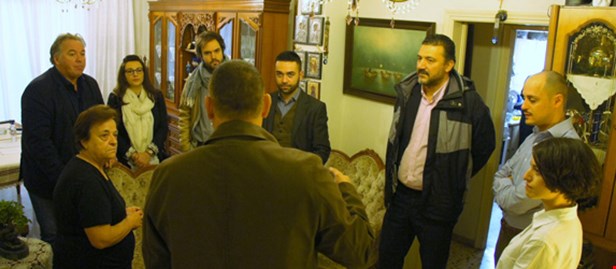SmartCare project visits Scotland and Greece
 © SmartCare
© SmartCare
As a member of the SmartCare project’s User Advisory Board (UAB), we took part in two site visits in Scotland and Greece in October. These site visits aim to give an in-depth understanding of how integrated care services are delivered locally, get feedback from all actors involved including patients, family carers, health professionals and social workers, and provide concrete recommendations to the local teams on how to improve the service from the view point of the users.
SmartCare is a project funded under the former EU Competitiveness and Innovation Programme. Its aim is to promote a more integrated and effective approach to providing health and social care to older people across Europe, by testing integrated care pathways that are supported by Information and Communication Technology (ICT). The project’s User Advisory Board undertook to conduct a series of site visits to evaluate the user experience and involvement in the services.
Scotland, Glasgow area
The SmartCare pilot in Scotland, part of Scotland’s 2020 Vision for Health and Care is centred on prevention and management of falls targeting elderly people. The pilot also aims at strengthening patients’ ability to self-care helping them take an active role in managing their condition. The most interesting feature of the Scottish approach to integrated care is that care pathways are designed and delivered based on a patient care plan. That care plan, which is jointly agreed with the patient and their family carers is addressing both the health and social care needs of the patient. Decision-making processes and practices seem to have changed in a favourable way as a result of actively involving the patient and their family members in defining the care plan. The user centred approach and collaborative service design is admirable and represents one of the most innovative aspects of the Scottish pilot site. NHS24, Scotland's national Telehealth and Telecare organisation, which is responsible for the implementation of the SmartCare project in Scotland, has been very successful at establishing effective mechanisms for service co-production bringing together patients and their family carers, IT developers, NHS employees (especially nurses, occupational therapists, and physiotherapists) and Social Services employees. However, the service still has room for development, as the involvement of GPs and specialists remains low. While this is one of the main challenges we have come across in other sites as well, if not addressed in a timely and effective manner it can pose a strain on NHS24’s ability to roll out the Smartcare services nation-wide in the medium-long run.
Greece, Attica region
In Greece the Smartcare service is piloted in three municipalities within the Attica region and is available to senior citizens diagnosed with Type II Diabetes Mellitus. The service allows integration of care provision by a multidisciplinary team in one single application. Patients are able to record vital parameters (blood pressure, blood glucose level) via Bluetooth from tele-monitoring devices they are provided with. The implementation of SmartCare represents a good first step in the integration of care in the region where social and healthcare sectors have traditionally been working is silos. Cross-functional collaboration among the various actors involved is one of the most distinct and positive aspects of the Greek pilot. During our visit, we could really appreciate the teamwork spirit and willingness to cooperate within and across the two sectors. The service offered in the context of the SmartCare project seems to be meeting the therapeutic needs of patients suffering from diabetes to a very large extent. All patients we met and talked to during the visit expressed their high satisfaction with the service, which is clearly contributing to empowering patients in Attica. While the disease-related needs of the patients seem to have been largely met, we believe in the future the service should, on the one hand, be offered to patients with other chronic diseases and comorbidities, and on the other able to elicit, recognise, and address the whole spectrum of individual needs of the person. To exploit the full potential of integrated care, we should move away from a disease-centred to a person-centred approach.
Contact: EPF Senior Programme Officer, Walter Atzori at walter.atzori@eu-patient.eu
